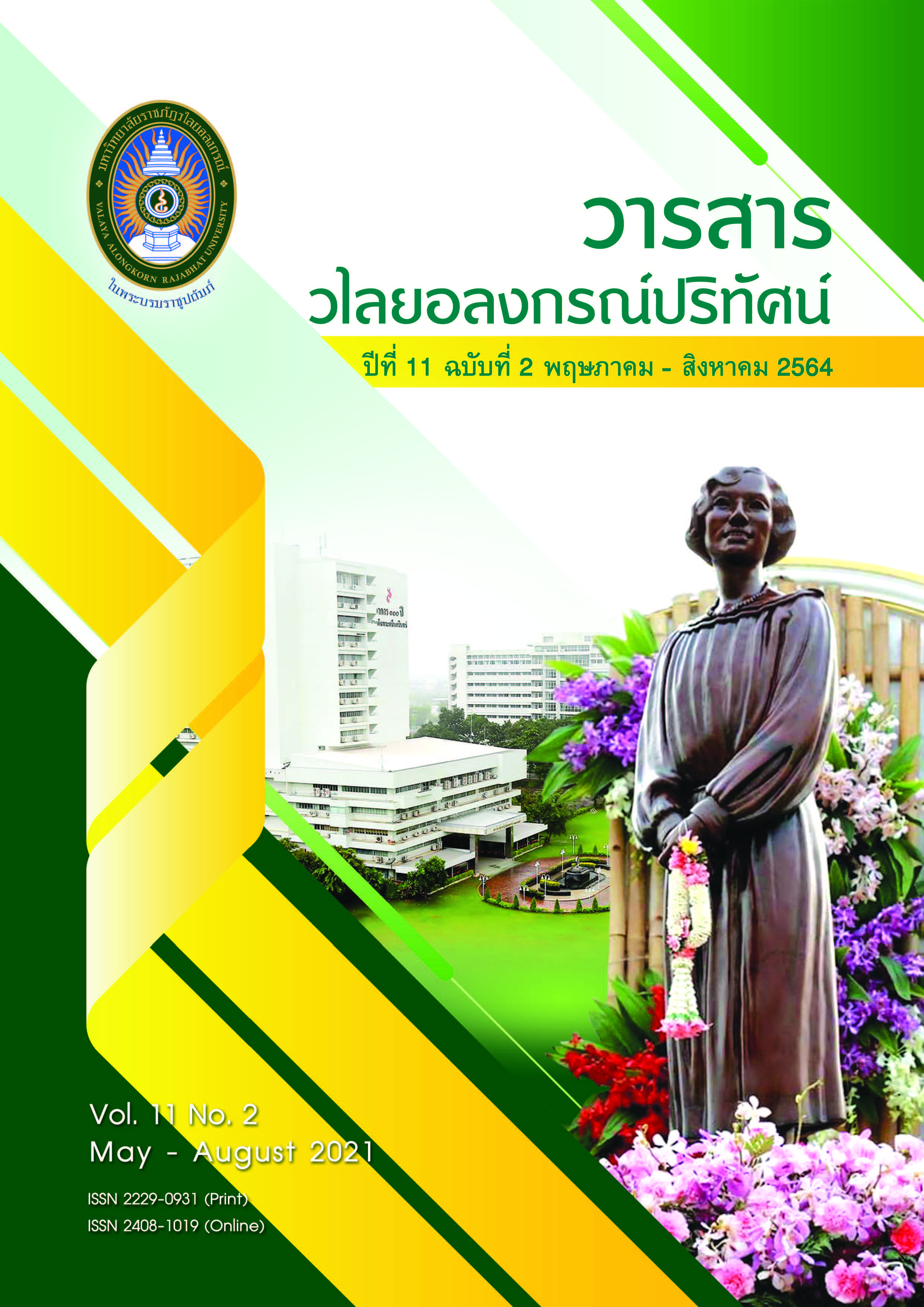ความสามารถในการกำกับตนเองในการเรียนรู้คำศัพท์ภาษาอังกฤษของนักศึกษามหาวิทยาลัยราชภัฏวไลยอลงกรณ์ ในพระบรมราชูปถัมภ์
คำสำคัญ:
ความสามารถในการกำกับตนเองในการเรียนรู้คำศัพท์ภาษาอังกฤษ, การเรียนรู้คำศัพท์ภาษาอังกฤษ, คำศัพท์บทคัดย่อ
งานวิจัยนี้มีวัตถุประสงค์เพื่อ 1) ศึกษาระดับความสามารถในการกำกับตนเองในการเรียนรู้คำศัพท์ภาษาอังกฤษของนักศึกษาชั้นปีที่ 3 มหาวิทยาลัยราชภัฏวไลยอลงกรณ์ ในพระบรมราชูปถัมภ์ 2) เปรียบเทียบระดับความสามารถในการกำกับตนเองในการเรียนรู้คำศัพท์ภาษาอังกฤษของนักศึกษาชายและหญิง และ 3) เปรียบเทียบระดับความสามารถในการกำกับตนเองในการเรียนรู้คำศัพท์ภาษาอังกฤษของนักศึกษาจากต่างคณะ การศึกษาในครั้งนี้เป็นการวิจัยเชิงปริมาณ เครื่องมือที่ใช้ในการเก็บรวบรวมข้อมูล คือ แบบสอบถามประเมินความสามารถในการกำกับตนเอง ในการเรียนรู้คำศัพท์ภาษาอังกฤษ ซึ่งผ่านการวิเคราะห์ค่าความเที่ยงอยู่ระหว่าง 0.76 - 0.89 กลุ่มตัวอย่างของการวิจัยเป็นนักศึกษามหาวิทยาลัยราชภัฏวไลยอลงกรณ์ ในพระบรมราชูปถัมภ์ ชั้นปีที่ 3 จาก 7 คณะ จำนวน 290 คน โดยกำหนดขนาดตามแนวทางของยามาเน่ที่ระดับ ความคลาดเคลื่อนที่ยอมรับได้ 0.05 ข้อมูลที่ได้นำมาวิเคราะห์ร้อยละ ค่าเฉลี่ย ส่วนเบี่ยงเบนมาตรฐาน การเปรียบเทียบความต่างของค่าเฉลี่ยของสองกลุ่มตัวอย่างที่เป็นอิสระจากกัน (Independent samples t-test) และความแปรปรวนทางเดียว (One-way ANOVA)
ผลการวิจัยแสดงให้เห็นว่า โดยภาพรวมนักศึกษาระดับชั้นปีที่ 3 มีความสามารถ ในการกำกับตนเองในการเรียนรู้คำศัพท์ภาษาอังกฤษอยู่ในระดับสูง ( = 3.41, S.D. = 0.54) โดยมีความสามารถในการกำกับตนเองในด้านการควบคุมสภาพแวดล้อมสูงที่สุด (
= 3.74, S.D. = 0.60) การเปรียบเทียบนักศึกษาชายและนักศึกษาหญิงพบว่าเพศไม่ส่งผลต่อความสามารถ ในการกำกับตนเองในการเรียนรู้คำศัพท์ภาษาอังกฤษในภาพรวม แต่ในรายด้านพบว่า นักศึกษาชาย มีความสามารถในด้านการควบคุมความยึดมั่นมากกว่านักศึกษาหญิงที่ระดับนัยสำคัญ .05 ส่วนผลการเปรียบเทียบนักศึกษาจากต่างคณะ พบว่า คณะไม่มีผลต่อความสามารถในการกำกับตนเองของนักศึกษาในภาพรวม แต่การเปรียบเทียบเป็นรายคู่แสดงให้เห็นว่านักศึกษาคณะวิทยาศาสตร์และเทคโนโลยีมีความสามารถในการกำกับตนเองในการเรียนรู้คำศัพท์ภาษาอังกฤษด้านการควบคุม ความยึดมั่นน้อยกว่านักศึกษาคณะวิทยาการจัดการ คณะครุศาสตร์ คณะมนุษยศาสตร์และสังคมศาสตร์ และคณะเทคโนโลยีอุตสาหกรรมที่ระดับนัยสำคัญ .05
เอกสารอ้างอิง
มัลลิกา บุนนาค. (2539). สถิติเพื่อการตัดสินใจ. กรุงเทพฯ: ภาควิชาสถิติ คณะพาณิชยศาสตร์และการบัญชี จุฬาลงกรณ์มหาวิทยาลัย.
Dörnyei, Z. (2005). The Psychology of the language learner. Mahwah: Lawrence Erlbaum Associates.
Gu, Y. (2002). Gender, academic major, and vocabulary learning strategies of Chinese EFL learners. RELC Journal. 33(1): 35-54.
Khezrlou, S. & Sadeghi, K. (2011). Self-regulated vocabulary strategy use: Implications for CALL and individual variables. MEXTESOL Journal. 36(1): 1-17.
Kirmizi, O. (2014). Measuring vocabulary learning strategy use of Turkish EFL learners in relation to academic success and vocabulary size. World Journal of Education. 4(6): 16-25.
Liu, Z. (2010). A study on English vocabulary learning strategies for non-English majors in independent college. Cross-cultural Communication. 6(4): 152-164.
Moiinvaziri, M. (2018). Exploring the role of self-regulatory capacity in vocabulary learning of Iranian EFL learners. Research in English Language Pedagogy. 6(2): 241-256.
Mongkol, N. (2009). A study of vocabulary learning strategies of the first and second year students from English department at Phetchaburi Rajabhat University. Humanities Journal. 16(1): 130-144.
Mizumoto, A. (2013). Effects of self-regulated vocabulary learning process on self-efficacy. Innovation in Language Learning and Teaching. 7(3): 253-265.
Nirattisai, S. (2014). Vocabulary Size and Vocabulary Learning Strategies of Thai University Students. Master of Arts Thesis in Teaching English as an International Languages, Prince of Songkla University.
Pintrich, P. R. (2000). The role of goal orientation in self-regulated learning. In M. Boekaeerts, P. R. Pintrich, & M. Zeidner (Eds.), Handbook of self-regulation. San Diego: Academic Press.
Read, J. (2004). Research in teaching vocabulary. Annual Review of Applied Linguistics. 24: 146-161.
Sadeghi, K. & Khezrlou, S. (2012). Glossing mode in self-regulated vocabulary learning, and its relationship with gender, age, and field of study. The Journal of Asia TEFL. 9(3): 51-74.
Sentürk, B. (2016). Self-regulation strategies and vocabulary size of EFL Turkish University students. Procedia - Social and Behavioral Sciences. 232: 90-97.
Siriwan, M. (2007). English vocabulary learning strategies employed by Rajabhat university students. Doctor of Philosophy in English Language Studies, Suranaree University of Technology.
Teng, F. (2015). Assessing the relationship between Vocabulary Learning Strategy Use and Vocabulary Knowledge. PASAA. 49: 39-65.
Thornbury, S. (2002). How to teach vocabulary. Harlow: Pearson Education Limited.
Tsai, C. & Chang, I. (2009). An examination of EFL vocabulary learning strategies of students at the University of Technology of Taiwan. International Forum of Teaching and Studies. 5(2): 32-38.
Tseng, W., Dörnyei, Z. & Schmitt, N. (2006). A new approach to assessing strategic learning: The case of self-regulation in vocabulary acquisition. Applied Linguistics. 27(1): 78-102.
Vujnović, M. (2017). The Role of Self-Regulation in EFL Vocabulary Knowledge. Master of Arts Thesis in English Language and Literature - Teaching English As a Foreign Language and Pedagogy, J. J. Strossmayer University of Osijek.
Wei, M. (2007). An examination of vocabulary learning of college-level learners of English in China. The Asian EFL Journal. 9(2): 93-114.
Yamane, T. (1967). Statistics: An Introductory Analysis. New York: Harper International Edition.
Yeh, C. & Wang, Y. (2004). An investigation into vocabulary learning strategies used by senior high school students in Taiwan. Taiwan Journal of TESOL. 1(2): 1-44.
Zhang, Y. (2011). The Use of Vocabulary Learning Strategies by Good and Poor Language Learners: A case study of Chinese non-English major sophomores. Dissertation, Kristianstad University, School of Teacher Education.
Zimmerman, B. J. (1990). Self-regulated learning and academic achievement: an overview. Educational Psychologist. 25(1): 3-17.
ดาวน์โหลด
เผยแพร่แล้ว
รูปแบบการอ้างอิง
ฉบับ
ประเภทบทความ
สัญญาอนุญาต
ข้อความที่ปรากฏในบทความแต่ละเรื่องในวารสารวไลยอลงกรณ์ปริทัศน์ เป็นความคิดเห็นของผู้นิพนธ์แต่ละท่าน มิใช่เป็นทัศนะและมิใช่ความรับผิดชอบของกองบรรณาธิการจัดทำวารสาร และ
มหาวิทยาลัยราชภัฏวไลยอลงกรณ์ ในพระบรมราชูปถัมภ์


